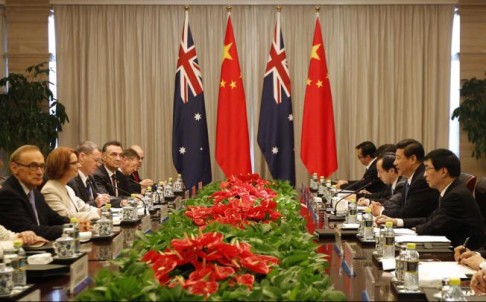Australia's
Prime Minister Julia Gillard (second left) speaks during a meeting with
China's President Xi Jinping (second right) on the sidelines of the
Boao Forum. Photo: AFP
China
may soon allow its currency to trade directly with the Australian
dollar, according to officials from the central bank and a top
government think tank.
The official at the People's Bank of China, who did not want to be identified, said moves were afoot to allow direct trade settlement between Australia and China, rather than through the US dollar, lowering transaction costs. He said the possibility was under discussion at the Boao Forum, on Hainan, but refused to provide a time frame.
There has been speculation that direct offshore trade settlement is high on Australian Prime Minister Julia Gillard's agenda on her current trip to China.
Zhang Ming, a deputy director of the Department of International Finance at the Institute of World Economics and Politics of the Chinese Academy of Social Sciences, said the two governments might move in that direction "quite soon".
Zhang said direct trading would promote internationalisation of the yuan and boost its circulation. "It will make yuan more attractive overseas," he said.
Xiang Songzuo, deputy chief of the Institute of International Currency at the People's University, also said Beijing has been weighing the idea for some time and although he would not guess when the policy will be formally announced, said: "It could be quite soon."
Direct settlement will allow the two currencies to sidestep the US dollar as a means of exchange, lowering exchange-rate risks for traders in addition to reducing transaction costs.
It will also help the two countries cement financial ties. China is Australia's No 1 trading partner. In January, Australia imported goods worth A$3.8 billion (HK$30.6 billion) from China, and its exports to China amounted to A$6.2 billion - nearly a third of its total exports.
Beijing says it wants about a third of its foreign trade settled in yuan by 2015. China already allows direct trading between its currency and that of Japan, one of its biggest trading partners.
Another person with knowledge of the matter, who also declined to be named, said Beijing will appoint around 10 banks as market makers for yuan-aussie trades, including several major Chinese banks and counterparts from Australia and elsewhere.
Zhang said the move would not affect the value of the Australian dollar and should have no impact on Hong Kong investors in the currency.
The official at the People's Bank of China, who did not want to be identified, said moves were afoot to allow direct trade settlement between Australia and China, rather than through the US dollar, lowering transaction costs. He said the possibility was under discussion at the Boao Forum, on Hainan, but refused to provide a time frame.
There has been speculation that direct offshore trade settlement is high on Australian Prime Minister Julia Gillard's agenda on her current trip to China.
Zhang Ming, a deputy director of the Department of International Finance at the Institute of World Economics and Politics of the Chinese Academy of Social Sciences, said the two governments might move in that direction "quite soon".
Zhang said direct trading would promote internationalisation of the yuan and boost its circulation. "It will make yuan more attractive overseas," he said.
Xiang Songzuo, deputy chief of the Institute of International Currency at the People's University, also said Beijing has been weighing the idea for some time and although he would not guess when the policy will be formally announced, said: "It could be quite soon."
Direct settlement will allow the two currencies to sidestep the US dollar as a means of exchange, lowering exchange-rate risks for traders in addition to reducing transaction costs.
It will also help the two countries cement financial ties. China is Australia's No 1 trading partner. In January, Australia imported goods worth A$3.8 billion (HK$30.6 billion) from China, and its exports to China amounted to A$6.2 billion - nearly a third of its total exports.
Beijing says it wants about a third of its foreign trade settled in yuan by 2015. China already allows direct trading between its currency and that of Japan, one of its biggest trading partners.
Another person with knowledge of the matter, who also declined to be named, said Beijing will appoint around 10 banks as market makers for yuan-aussie trades, including several major Chinese banks and counterparts from Australia and elsewhere.
Zhang said the move would not affect the value of the Australian dollar and should have no impact on Hong Kong investors in the currency.
This article first appeared in the
South China Morning Post print edition on Apr 08, 2013 as Beijing
looking at direct trade with Australian dollar

No comments:
Post a Comment